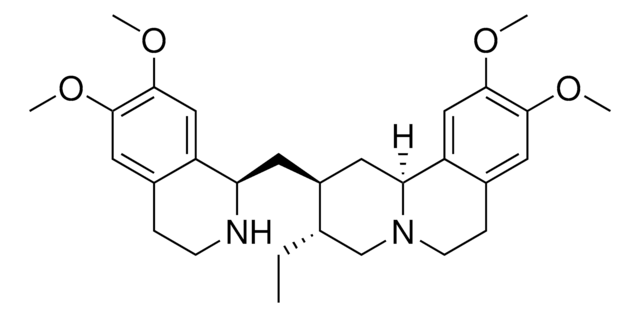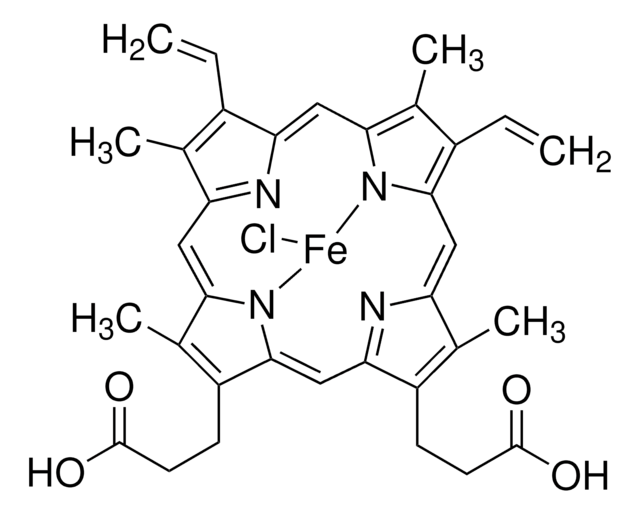324693
Emetine dihydrochloride
≥98% (HPLC), solid, protein synthesis blocker, Calbiochem®
Synonym(s):
Emetine, Dihydrochloride, 6ʹ,7ʹ,10,11-Tetramethoxyemetan, 2HCl
About This Item
Recommended Products
Product Name
Emetine, Dihydrochloride, Principal alkaloid of ipecac, isolated from the ground roots of Uragoga ipecacuanha.
Quality Level
Assay
≥98% (HPLC)
form
solid
manufacturer/tradename
Calbiochem®
storage condition
OK to freeze
desiccated (hygroscopic)
protect from light
color
white to off-white
white
solubility
water: 20 mg/mL
ethanol: soluble
shipped in
ambient
storage temp.
2-8°C
SMILES string
[Cl-].[Cl-].N21[C@@H](C[C@@H]([C@H](C2)CC)C[C@H]4NCCc5c4cc(c(c5)OC)OC)c3c(cc(c(c3)OC)OC)CC1.[H+].[H+]
InChI
1S/C29H40N2O4.2ClH/c1-6-18-17-31-10-8-20-14-27(33-3)29(35-5)16-23(20)25(31)12-21(18)11-24-22-15-28(34-4)26(32-2)13-19(22)7-9-30-24;;/h13-16,18,21,24-25,30H,6-12,17H2,1-5H3;2*1H/t18-,21-,24+,25-;;/m0../s1
InChI key
JROGBPMEKVAPEH-GXGBFOEMSA-N
General description
Biochem/physiol Actions
Movement of ribosomes along the mRNA
Warning
Reconstitution
Other Notes
Khan, M.A. 1995. Prog. Neurobiol.46, 541.
Kokuho, T., et al. 1995. Immunobiology193, 42.
Lee, Y.S., and Wurster, R.D. 1995. Cancer Lett.93, 157.
Burhans, W.C., et al. 1991. EMBO J. 10, 4351.
Filley, E.A., and Rook, G.A. 1991. Infect. Immun.59, 2567.
Landis, R.C., et al. 1991. J. Immunol.146, 128.
Schweighoffer, T., et al. 1991. Histochemistry96, 93.
Legal Information
Signal Word
Danger
Hazard Statements
Precautionary Statements
Hazard Classifications
Acute Tox. 1 Oral - Eye Irrit. 2 - Skin Irrit. 2
Storage Class Code
6.1A - Combustible acute toxic Cat. 1 and 2 / very toxic hazardous materials
WGK
WGK 3
Flash Point(F)
Not applicable
Flash Point(C)
Not applicable
Regulatory Listings
Regulatory Listings are mainly provided for chemical products. Only limited information can be provided here for non-chemical products. No entry means none of the components are listed. It is the user’s obligation to ensure the safe and legal use of the product.
JAN Code
324693-250MG:
324693-28GM:
324693-MG:
324693-1GM:
324693-30GM:
Certificates of Analysis (COA)
Search for Certificates of Analysis (COA) by entering the products Lot/Batch Number. Lot and Batch Numbers can be found on a product’s label following the words ‘Lot’ or ‘Batch’.
Already Own This Product?
Find documentation for the products that you have recently purchased in the Document Library.
Our team of scientists has experience in all areas of research including Life Science, Material Science, Chemical Synthesis, Chromatography, Analytical and many others.
Contact Technical Service







